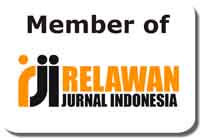Improving the Students' English Skills through Online Activities in Moodle Platform
Abstract
Keywords
Full Text:
PDFReferences
Arifin, Z. (2012). Penelitian Pendidikan Metode dan Paradigma Baru. In Rosdakarya. https://doi.org/10.1016/S0969-4765(04)00066-9
Bader Al Bataineh, K., Abdullah Ahmed Banikalef, A., & H. Albashtawi, A. (2019). The Effect of Blended Learning on EFL Students’ Grammar Performance and Attitudes: An Investigation of Moodle. Arab World English Journal. https://doi.org/10.24093/awej/vol10no1.27
Castro, K. R. (2017). Moodle-Based Worksheets to Enhance Reading Comprehension. https://doi.org/-
Cedar, P. (2013). EFL Online Learning versus Classroom Learning by Thai Students, The Asian ESP Journal. Volume 9 Issue 1, 28-53
Cordova, J. V., & Dechsubha, T. (2018). Using moodle in improving listening abilities in english for specific purposes of vongchavalitkul university students. Asian ESP Journal.
Darmawan, D. (2014). Pengembangan E-LEARNING Teori dan Desain. In Remaja Rosdakarya. https://doi.org/Bandung: PT. Remaja Rosdakarya
Eamjoy, A., (2015). Astudy of needs and barriers in english communication skills of thai secretaries at the women secretaries and administrative professionals association of Thailand (WSAT) . Master of Arts English for Careers Language Institute. Thammasat University. Bangkok
Elhawwa, T. (2017). The implementation of Moodle platform through lecturer’s perspectives at English department. Journal on English as a Foreign Language, 7(2), 227. https://doi.org/10.23971/jefl.v7i2.502
Gluchmanova, M. (2017). Creation of e-courses in english for students of production technology. TEM Journal. https://doi.org/10.18421/TEM63-25
Gunduz, N., & Ozcan, D. (2017). Implementation of the Moodle System Into EFL Classes. Profile: Issues in Teachers´ Professional Development. https://doi.org/10.15446/profile.v19n_sup1.68571
Irawan, R., & Surjono, H. D. (2018). Pengembangan e-learning berbasis moodle dalam peningkatkan pemahaman lagu pada pembelajaran bahasa inggris. Jurnal Inovasi Teknologi Pendidikan. https://doi.org/10.21831/jitp.v5i1.10599
Khabbaz, M., & Najjar, R. (2015). Moodle-based distance language learning strategies: An evaluation of technology in language classroom. International Journal of Applied Linguistics and English Literature. https://doi.org/10.7575/aiac.ijalel.v.4n.4p.205
Noirid, Surachet; Srisa-ard, B. (2007). E-learning Models: A Review of Literature. The 1st International Conference on Educational Reform.
Nurhayati, D. (2013). The Development of Moodle Based English Reading Material, Language Circle Journal of Language and Literature Vol. VIII/1,35-43
Porter, P. A., & Brown, D. (1997). The Elements of Language Curriculum: A Systematic Approach to Program Development. TESOL Quarterly, 31(4), 814. https://doi.org/10.2307/3587769
Richards, J. C., & Rodgers, T. S. (2001). Approaches and Methods in Language Teaching. In Approaches and Methods in Language Teaching. https://doi.org/10.1017/cbo9780511667305
Richards, J. C., & Schmidt, R. (2010). Longman dictionary of language teaching & applied linguistics. In Proceedings of the 21st Asian Pacific Weed Science Society (APWSS) Conference, 2-6 October 2007, Colombo, Sri Lanka.
Robertson, C. E. (2008). Integration of moodle course management system (CMS) into an EFL writing class. The JALT CALL Journal,.
Stanford, J. (2009). Moodle 1.9 for second language teaching: Engaging online language-learning activities using the Moodle platform. In Language Teaching.
Tomlinson, B. (2011). Introduction: principles and procedures of materials development. In Materials Development in Language Teaching.
Toselli, M & Milan, A.M. (2006) English for Secretaries and Administrative Personnel. New York: McGraw-Hill
Wade, J. C. (2018). Towards Autonomy in Language Learning: Theoretical Implications and Practical Applications. Verbum. https://doi.org/10.15388/verb.2017.8.11335
DOI: http://dx.doi.org/10.31332/lkw.v6i1.1846
Copyright (c) 2020 didik hariyadi raharjo

This work is licensed under a Creative Commons Attribution-ShareAlike 4.0 International License.
Langkawi: Journal of The Association for Arabic and English indexed by:


















.png)
.png)

.png)
2.png)








